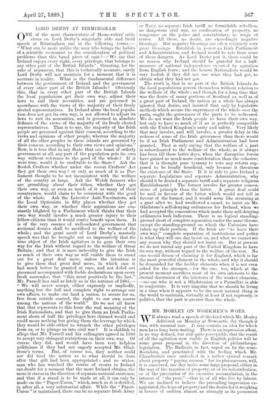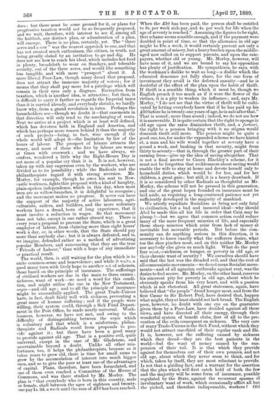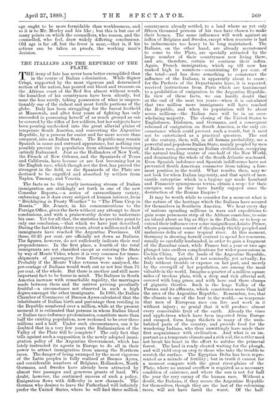MR. MORLEY ON WORKMEN'S WOES.
WE always read a speech of the kind which Mr. Morley delivered on Monday at Newcastle, dry though it was, with unusual care. It may contain an idea for which men have long been waiting. There is an impression afloat, in no way defined, but still quite perceptible, that the result of all the agitation now visible in English politics will be some great proposal in the direction of philanthropic legislation. The Radicals, in fact, urged on by the semi- Socialists, and penetrated with the feeling which Mr. Chamberlain once embodied in a rather cynical remark about property " paying ransom " for its pleasantness, will, it is conceived, one day make some large proposal, either in the way of the taxation of property, or of its redistribution, or of the prevention of its excessive accumulation, in the interest of " the poor,"—that is, of all who live by labour. We are inclined to believe the prevailing impression ex- aggerated, the hope of property and the desire for it weighing in favour of caution almost as strongly as its possession does ; but there must be some ground for it, or plans for progressive taxation would not be so frequently proposed, and we wait, therefore, with interest to see if, among all the hubbub, any distinct plan, or adumbration of a plan, will emerge. There is no plan, certainly, yet. The " three acres and a cow " was the nearest approach to one, and that has not created much enthusiasm, the citizen, in truth, not being greatly elated by an invitation to go and dig. He does not see how to reach his ideal, which includes hot food in plenty, broadcloth to wear on Sundays, and tolerable security, out of the three acres, and would like something less tangible, and with more " prospect " about it. A more liberal Poor-Law, though many dread that proposal, does not attract the immense majority of voters ; for it means that they shall pay more for a privilege which will remain in their eyes only a disgrace. Exemption from taxation, which is another idea, is attractive ; but then, it is difficult to carry it farther as regards the Imperial taxes than it is carried already, and everybody shrinks, we hardly know why, from a grand revolution in rates. Perhaps the householders see—though we doubt it—that easements in that direction will only tend to the surcharging of rents. Next we arrive at a project which is at least well defined, which has devotees both in England and America, and which has perhaps more reason behind it than the majority of such projects—being, in fact, wise enough if the whole world will adopt it—the limitation by law of the hours of labour. The prospect of leisure attracts the weary, and most of those who live by labour are weary at times with overwork ; and we have always, we confess, wondered a little why the Eight-Hours Day is not more of a popular cry than it is. It is not, however, taken up with any eagerness even by the workers, who are divided as to its possibility ; while the Radicals and the philanthropists regard it with strong aversion. Mr. Morley, for example, though he owes his seat to New- castle workmen, fights this proposal with a kind of haughty, plain-spoken independence, which in this day, when most men are as willow-branches, it is delightful to recognise ; and the movement makes no progress. It never can have the support of the majority of active labourers, agri- culturists, sailors, and builders, and the more sedentary workers have a dread, born of long experience, that it must involve a reduction in wages. So that movement does not take, except in one rather absurd way. There is every year a proposal to prevent the State, which is a great employer of labour, from claiming more than eight hours' work a day, or, in other words, that the State should pay more than anybody else ; but it is always defeated, and is, we imagine, defended rather as a method of advertising popular Members, and announcing that they are the true " Friends of Labour," than with a hope of any immediate or practical result. The world, then, is still waiting for the plan which is to unite common-sense and benevolence ; and while it waits, a good many turn with lively hope to another set of schemes, those based on the principle of insurance. The sufferings of civilised workers are due in the main to three causes : sickness, want of work—we need a word for this condi- tion, and might utilise the one in the New Testament, argia—and old age ; and to all the principle of insurance might be successfully applied. The great Trade-Unions have, in fact, dealt fairly well with sickness, preventing a great mass of human suffering ; and if the people were willing, their system could, through a Sick Fund Depart- ment in the Post Office, be made nearly universal. Work- lessness, however, we have not met, and owing to the difficulty of distinguishing between the argia which is voluntary and that which is a misfortune, philan- thropists and Radicals recoil from proposals to pro- vide against it ; but there have been a good many to provide against old age. That is a positive evil, quite universal, except in the case of Mr. Gladstone, and ascertainable beyond a doubt. Unlike all other mis- fortunes, too, it helps the philanthropists, because as it takes years to grow old, there is time for small sums to grow by the accumulation of interest into much bigger ones, and so to give the poor at least one of the advantages of capital. Plans, therefore, have been formulated, and one of them even reached a Committee of the House of Commons, and was there studied by Mr. Morley. The plan is " that everybody who is born in this country, male or female, shall between the ages of eighteen and twenty- one pay ls. 3d. a week until the sum of £10 has been reached. When the £10 has been paid, the person shall be entitled to 8s. per week sick-pay, and 4s. per week for life when the age of seventy is reached." Assuming the figures to be right, that scheme seems sensible enough, and if the payment were doubled in point of time, so that the allowance in old age might be 10s. a week, it would certainly prevent not only a great amount of misery, but a heavy burden upon the middle- aged now called on to support parents, and upon the rate- payers, whether old or young. Mr. Morley, however, will have none of it, and we are bound to say his opposition has plenty of justification. He sympathises, he says, with the workman's dislike to wait so long—a dislike which the educated denounce yet fully share, for the one form of investment they avoid is the deferred annuity—and he is doubtful of the effect of the plan upon the habit of thrift. If thrift is a sensible thing, which it must be, though we English preach it too much as if it were the flower of the virtues, it is a pity to weaken its influence ; and, says Mr. Morley, " I do not see that the virtue of thrift will be culti- vated by letting everybody know that if he has paid up his £10 before he is twenty-one years of age, he is safe after that." That is sound ; more than sound ; indeed, we do not see how it is answerable. It is quite certain that the right to sponge in old age upon the rates diminishes thrift, and, a fortiori, the right to a pension bringing with it no stigma would diminish thrift still more. The pension might be quite a good one, too, for under the expanded scheme we have hinted at, a man and his wife would together at seventy have a pound a week, and basking in that security, might from thirty to seventy—that is, through the greater part of their earning lives—give up the idea of saving altogether. That is not a final answer to Canon Blackley's scheme, for it must not be forgotten that recklessness about saving would enable the wife to stay at home and devote herself only to household duties, which would be for her, and for her children, a great gain ; but still, it is a heavy drawback. If it is so considered by other Radicals as thoughtful as Mr. Morley, the scheme will not be pressed in this generation, and one of the great hopes founded on insurance must be laid aside, as requiring a long-continued patience not yet sufficiently developed in the majority of mankind. We utterly repudiate Socialism as being not only fatal to civilisation, but a bad and immoral ideal—why should Abel be made thin all his life in order that Cain may be plump ?—but we agree that common action could reduce many of the more frequent miseries of life, and especially those sharp miseries which arise from lack of money at inevitable but moveable periods. But before the com- munity can do anything serious in this direction, it is necessary to know exactly what the sufferers desire, what toe the shoe pinches most, and on this neither Mr. Morley nor anybody else gives us much light. What do the poor fear most,—sickness, or hunger, or poverty in old age, or their chronic want of security ? We ourselves should have said that the last was the dreaded evil, and that the root of all communistic movements—we do not mean Socialist move- ments—and of all agrarian outbreaks against rent, was the desire to feel secure. Mr. Morley, on the other hand, reserves his sincerest pity for poverty in old age, about which he obviously speaks from his very heart, and with a passion which is not rhetorical. All great statesmen, again, have believed that "the people" dread hunger most, and from the first Caesar to Sir Robert Peel, have desired that, happen what might, they at least should not lack bread. The English poor, however, no doubt with one eye on the guarantee given them by a Poor-Law, have decided against all these views, and have directed all their energy, through their wonderful system of benefit clubs, first of all to the pre- vention of the evils consequent on sickness. The very core of many Trade-Unions is the Sick Fund, without which they would not attract one-third of their regular rank and file. It is, however, not the suffering caused by sickness which they dread—they are the best patients in the world—but the want of money caused by the sus- pension of their toil. It is that which they provide against for themselves out of their own pennies, and not old age, about which they never seem to think, and for which, taken by itself, they are most reluctant to provide. Is not that a guiding fact, and a warrant for the assertion that the plan which will first catch bold of both the few and the majority will be some form of insurance, possibly regulated by the State, against the recurrent spasms of involuntary want of work, which occasionally afflict all but the picked, and therefore indispensable, workers ? Old age ought to be more formidable than worklessness, and so it is to Mr. Morley and his like ; but this is but one of many points on which the counsellors, who reason, and the counselled, who feel, draw widely differing conclusions. Old age is far off, but the fever is near,—that is, if his actions can be taken as proofs, the working man's decision.




































 Previous page
Previous page